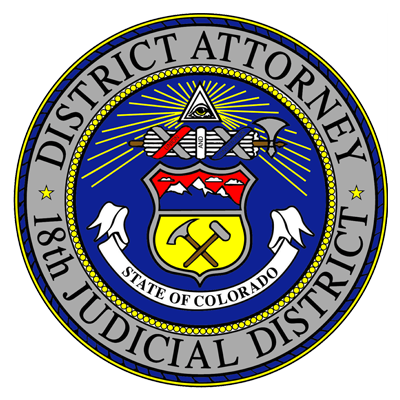The 18th Judicial District Diversion Counseling Program’s Adult and Juvenile Restitution Policy
The Diversion Counseling Program (DCP) follows the Colorado Revised Statutes Title 18. Criminal Code § 18-1.3-603. Victims and communities may suffer financial harm when the law is broken. It is the defendant’s obligation to repair this harm and to make amends by paying restitution. Restitution is a sum of money paid to compensate the victim for their loss or injury, directly related to the crime, caused by the defendant’s criminal behavior. Restitution is mandatory and this policy applies in every case where restitution is owed. Restitution must be paid in full within two (2) years of acceptance into DCP.
The Diversion Restitution Team (DRT) will work to collect documentation of losses to determine a reasonable total. Restitution may include property loss or damage, medical bills, mental health costs, home and car repairs, as well as costs paid out by the 18th Judicial Victim Compensation Board. Once the restitution amount has been determined, the DRT will provide the defendant with a restitution agreement within 60 days of the defendant’s acceptance into DCP. Supporting documentation in the victim impact statement needs to be requested by the defense attorney or the pro-se defendant through the discovery process. If the defendant cannot fully pay the restitution, DCP will work with the defendant to create a reasonable payment plan. If a defendant disagrees with the restitution amount requested by DRT, the defendant can take the case back to court.
Per House Bill 22-1373, DCP will not seek restitution from juveniles for insurance companies.
The goal of a restitution payment plan is to ensure the victim receives restitution in a timely manner and in full. DCP will work with the defendant to make the payment plan realistic and balanced with that goal. If the defendant misses payments, DRT reserves the right to add up to a $25 late payment fee for each missed payment to the restitution owed.
As outlined in the signed restitution agreement, three missed restitution payments in total puts the case in a non-compliance standing with DCP. As part of accountability, victims are afforded restitution to compensate for loss or injury. Failure to pay restitution in full in a timely manner is grounds for the case to be returned to the district attorney to review for filing of charges in court.
Restitution may be paid by cash, credit card (service fee will apply), personal check, cashier’s check, or money order. All checks, cash, money order, and cashier’s checks should be mailed directly to:
18th Judicial District Attorney’s Office
Diversion Counseling Program
Attn: Jennifer Hankins
4000 Justice Way, Suite 2525A
Castle Rock, CO 80109
All checks must be made out to the “Office of the District Attorney-18th JD”.
Restitution checks will be mailed to victims at their last known address. Victims must keep their contact information, including address, updated and current with DRT. All uncashed restitution checks will be annually reported to the Great Colorado Payback with the State Treasurer’s Office.
If we have one or more co-defendants in a case, the 60-day restitution deadline begins with the client that first enters DCP acceptance date.
Payments must be at least $25.00, so the calculation for each RA will be as follows:
Explanation of how payment plans will be created: payment amounts will be calculated for each individual.
Total divided by 24 payments = monthly payment amount
or
Total divided by $25.00 = number of monthly payments, whichever is greater.
Unless otherwise directed, DRT will calculate the 2 years/24 payments as starting when the RA is signed/60 days after acceptance into the program because victims have 60 days to provide documentation of requested restitution.
Examples:
Client A owes $10,600
$10,600/$25 = 424 payments or 35 years and 4 months
$10.600/24 payments = $442 per month
Client A will need to pay the $442 per month for 24 months.
Client B owes $150
$150/$25 = 6 payments
$150/24 payments = $6.25 per payment.
Client B will need to pay 6 payments of $25 each.
Payment Fees:
A convenience fee of $1 will be charged for payments made using an electronic check, regardless of the transaction amount. The convenience fee for credit cards are as follows: the amount of the (payment + $.75 x 2.25%) + $.75 (example for a payment of $10.00): ($10 + $.75) x 2.25% = $10.75 x 2.25% = $.24 + $.75=$.99. Your card would be charged $10.99 for the transaction.).
Service fees apply at rates of $.75 x 2.25% for credit cards, and $1.00 for e-checks. Service fees do not apply to the restitution payment total.

